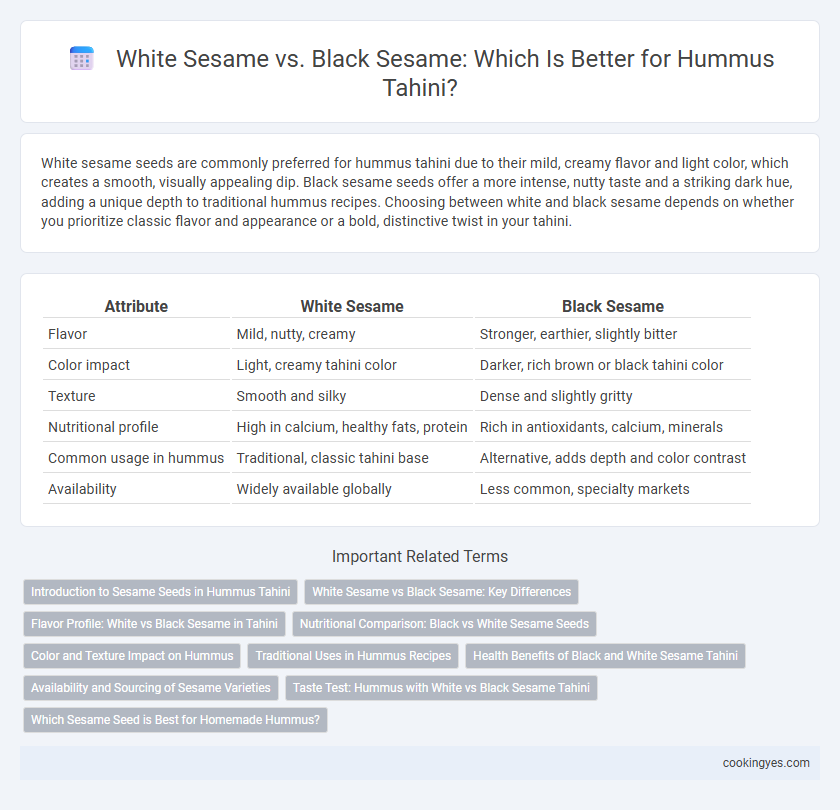White sesame seeds are commonly preferred for hummus tahini due to their mild, creamy flavor and light color, which creates a smooth, visually appealing dip. Black sesame seeds offer a more intense, nutty taste and a striking dark hue, adding a unique depth to traditional hummus recipes. Choosing between white and black sesame depends on whether you prioritize classic flavor and appearance or a bold, distinctive twist in your tahini.
Table of Comparison
| Attribute | White Sesame | Black Sesame |
|---|---|---|
| Flavor | Mild, nutty, creamy | Stronger, earthier, slightly bitter |
| Color impact | Light, creamy tahini color | Darker, rich brown or black tahini color |
| Texture | Smooth and silky | Dense and slightly gritty |
| Nutritional profile | High in calcium, healthy fats, protein | Rich in antioxidants, calcium, minerals |
| Common usage in hummus | Traditional, classic tahini base | Alternative, adds depth and color contrast |
| Availability | Widely available globally | Less common, specialty markets |
Introduction to Sesame Seeds in Hummus Tahini
White sesame seeds are the traditional choice for hummus tahini, offering a mild, nutty flavor and creamy texture that complements chickpeas. Black sesame seeds provide a more intense, earthy taste and a distinct visual contrast, enhancing both flavor complexity and presentation. Both varieties deliver rich nutrients like healthy fats, protein, and antioxidants, impacting the tahini's taste and nutritional profile.
White Sesame vs Black Sesame: Key Differences
White sesame seeds are traditionally preferred for hummus tahini due to their mild, nutty flavor and lighter color, which produces a creamier tahini with a smooth texture. Black sesame seeds offer a stronger, earthier taste and a richer, darker hue, imparting a distinctive visual appeal and robust flavor to the hummus. Nutritionally, black sesame seeds contain higher antioxidant levels, while white sesame seeds provide a more delicate balance of oils and proteins ideal for classic tahini preparation.
Flavor Profile: White vs Black Sesame in Tahini
White sesame seeds produce a milder, nuttier tahini with a smooth, creamy texture ideal for classic hummus recipes. Black sesame seeds offer a bolder, earthier flavor and a slightly bitter undertone that adds depth and a unique twist to traditional tahini. Choosing between white and black sesame significantly impacts the hummus's taste, with white sesame providing subtlety and black sesame delivering intense, complex notes.
Nutritional Comparison: Black vs White Sesame Seeds
Black sesame seeds contain higher levels of calcium, iron, and antioxidants compared to white sesame seeds, making them a nutrient-dense choice for hummus tahini. White sesame seeds have a milder flavor and slightly lower oil content, contributing to a smoother tahini texture. Both seed varieties provide essential healthy fats, protein, and fiber, but black sesame's richer mineral profile supports enhanced nutritional benefits in hummus.
Color and Texture Impact on Hummus
White sesame seeds create a smoother, creamier tahini with a pale, light color that maintains the classic appearance of traditional hummus. Black sesame seeds impart a nuttier, slightly earthier flavor and a darker hue, resulting in hummus with a richer color and a more textured, robust mouthfeel. The choice between white and black sesame significantly influences the visual appeal and consistency, tailoring hummus to either a classic or bold presentation.
Traditional Uses in Hummus Recipes
White sesame seeds are traditionally favored in hummus tahini for their mild flavor and creamy texture, enhancing the smoothness of the dip. Black sesame seeds, while less common, offer a nuttier, earthier taste and a slightly gritty texture, often used in regional variations or to impart a unique visual contrast. Classic Middle Eastern hummus recipes predominantly use white sesame tahini to maintain the authentic balance of flavors that complement chickpeas and garlic.
Health Benefits of Black and White Sesame Tahini
Black sesame tahini contains higher levels of antioxidants such as sesamin and sesamolin, which support heart health and reduce inflammation more effectively than white sesame. White sesame tahini offers a milder flavor and is rich in calcium and magnesium, promoting bone health and muscle function. Both varieties provide essential healthy fats, protein, and fiber, contributing to overall nutritional benefits in hummus.
Availability and Sourcing of Sesame Varieties
White sesame seeds dominate the global market and are more readily available for tahini production due to widespread cultivation in countries like Sudan, India, and Mexico. Black sesame seeds, less common and primarily sourced from East Asia, are considered specialty ingredients and are harder to find in most western markets. The choice between white and black sesame for hummus tahini often depends on accessibility and regional supply chains influencing ingredient sourcing decisions.
Taste Test: Hummus with White vs Black Sesame Tahini
Hummus made with white sesame tahini offers a smooth, creamy texture and a mild, nutty flavor that complements the chickpeas without overpowering them. In contrast, black sesame tahini provides a bolder, earthier taste with slightly bitter undertones, creating a more complex and visually striking hummus. Taste tests reveal that white sesame tahini is preferred for classic hummus, while black sesame appeals to those seeking a unique, robust flavor profile.
Which Sesame Seed is Best for Homemade Hummus?
White sesame seeds are traditionally preferred for homemade hummus tahini due to their milder, nuttier flavor and smoother texture, which blends seamlessly into creamy hummus. Black sesame seeds impart a stronger, earthier taste and a slightly gritty texture, making them less common but ideal for a bold twist or visual contrast in hummus. The choice depends on flavor preference and presentation, but white sesame seeds remain the optimal choice for classic, smooth, and balanced homemade hummus.
White sesame vs Black sesame for Hummus Tahini Infographic

 cookingyes.com
cookingyes.com